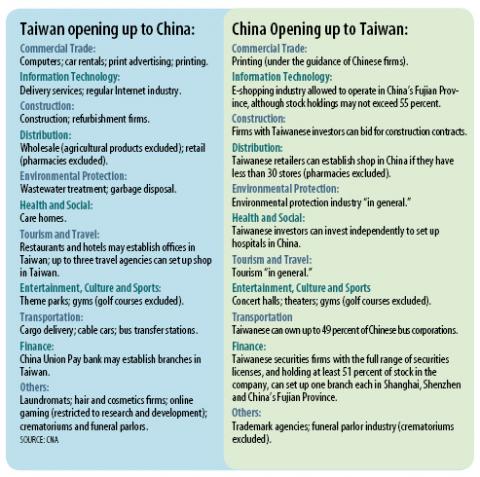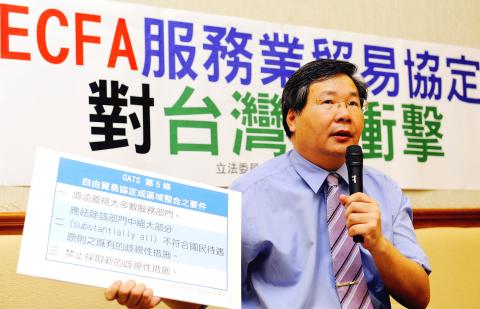The signing of a service trade agreement with China could affect issues on the legislature’s agenda during the extra session this week, after the Taiwan Solidarity Union (TSU) yesterday vowed to block all proceedings in the remaining four days.
TSU legislative caucus whip Hsu Chung-hsin (許忠信) told a press conference that the trade pact would subject local businesses to fierce competition, bring in white-collar Chinese workers, and lead to an outflow of Taiwanese expertise and knowledge to China.
The service trade agreement is one of the follow-up agreements to the Economic Cooperation Framework Agreement (ECFA) which came into effect in July 2010.

GRAPHIC: TT
Although there are more stringent restrictions on Chinese investments in certain industries covered by the service trade agreement, under WTO rules, those safeguards will have to be lifted after the end of the interim period of 10 years following the ECFA’s signing, Hsu said.
“From then on, Taiwan will be wide open to China” because limiting the number of China-funded firms, share holdings, scope of business activities and recruitment of Chinese employees would be considered a violation of the core principles of the WTO, Hsu said.
Under the agreement, China would open 80 service sectors to Taiwan, while Taiwan would open 64 sectors to China. The sectors include those related to commerce, telecommunications, construction, distribution, the environment, health, tourism, entertainment, culture, sports, transportation and finance.

Photo: George Tsorng, Taipei Times
The wide range of industries covered by the trade pact was not made public until the agreement was signed at 2pm on Friday in Shanghai.
Hsu said that financial conglomerates would benefit from the agreement because the pact would facilitate access to the Chinese banking, insurance and securities markets, but that will “come at the expense of the majority of small and medium-sized enterprises and workers in Taiwan.”
The TSU demanded that Premier Jiang Yi-huah (江宜樺) present the pact before the legislature to discuss with lawmakers how it would affect the nation, and that the deal should take effect only after the legislature approves it.
The TSU will boycott the remaining days of the extra session scheduled for next month to force the Chinese Nationalist Party (KMT) to agree to its demands, Hsu said.
During the session, the KMT had expected to pass an amendment to the Income Tax Act (所得稅法) to scrap the 8,500-point TAIEX threshold that automatically triggers the imposition of the tax on most individual investors. It also wants to pass a proposed referendum on the Fourth Nuclear Power Plant in New Taipei City’s (新北市) Gongliao District (貢寮) as well as clearing a number of other bills before the extra session ends on Thursday.
The KMT also considers the draft senior secondary education act (高級中等教育法) as urgent, considering the limited time left to prepare for the planned 12-year education scheme, set to begin in August next year.
Lawmakers across party lines on Friday called for a full and detailed examination of the signed service trade pact, with the opposition demanding that the legislature examine the deal thoroughly before deciding whether to allow it to go into effect.
KMT caucus whip Lin Hung-chih (林鴻池) yesterday said his party was not opposed to a review of the agreement by the legislature, but did not consider it necessary that Jiang present it at a question-and-answer session with lawmakers.
Lin said the KMT hoped the bills that were scheduled to be dealt with this week would not be delayed by the service trade pact issue.
Democratic Progressive Party (DPP) caucus whip Ker Chien-ming (柯建銘) asked President Ma Ying-jeou (馬英九) to step forward to address the public’s concerns.
Ker said the DPP would otherwise boycott a review of the agreement and demanded that the agreement be overruled and that Taiwan restart negotiations with China over the opening up of the service sector.

The CIA has a message for Chinese government officials worried about their place in Chinese President Xi Jinping’s (習近平) government: Come work with us. The agency released two Mandarin-language videos on social media on Thursday inviting disgruntled officials to contact the CIA. The recruitment videos posted on YouTube and X racked up more than 5 million views combined in their first day. The outreach comes as CIA Director John Ratcliffe has vowed to boost the agency’s use of intelligence from human sources and its focus on China, which has recently targeted US officials with its own espionage operations. The videos are “aimed at

STEADFAST FRIEND: The bills encourage increased Taiwan-US engagement and address China’s distortion of UN Resolution 2758 to isolate Taiwan internationally The Presidential Office yesterday thanked the US House of Representatives for unanimously passing two Taiwan-related bills highlighting its solid support for Taiwan’s democracy and global participation, and for deepening bilateral relations. One of the bills, the Taiwan Assurance Implementation Act, requires the US Department of State to periodically review its guidelines for engagement with Taiwan, and report to the US Congress on the guidelines and plans to lift self-imposed limitations on US-Taiwan engagement. The other bill is the Taiwan International Solidarity Act, which clarifies that UN Resolution 2758 does not address the issue of the representation of Taiwan or its people in

US Indo-Pacific Commander Admiral Samuel Paparo on Friday expressed concern over the rate at which China is diversifying its military exercises, the Financial Times (FT) reported on Saturday. “The rates of change on the depth and breadth of their exercises is the one non-linear effect that I’ve seen in the last year that wakes me up at night or keeps me up at night,” Paparo was quoted by FT as saying while attending the annual Sedona Forum at the McCain Institute in Arizona. Paparo also expressed concern over the speed with which China was expanding its military. While the US

SHIFT: Taiwan’s better-than-expected first-quarter GDP and signs of weakness in the US have driven global capital back to emerging markets, the central bank head said The central bank yesterday blamed market speculation for the steep rise in the local currency, and urged exporters and financial institutions to stay calm and stop panic sell-offs to avoid hurting their own profitability. The nation’s top monetary policymaker said that it would step in, if necessary, to maintain order and stability in the foreign exchange market. The remarks came as the NT dollar yesterday closed up NT$0.919 to NT$30.145 against the US dollar in Taipei trading, after rising as high as NT$29.59 in intraday trading. The local currency has surged 5.85 percent against the greenback over the past two sessions, central